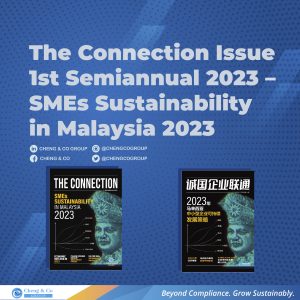
Editor’s Note
Mr. Teo Yang Zhi, Market Development Manager
Greetings to all Cheng & Co Member Firms that joined the big family, it’s our honor to have SIX CONSULTING SDN BHD – Dato’ Vimmy Yap, C&T ADVISORY SDN BHD – Teo Yang Peng, CGC & Associates – Jeffery Cheah, PREMIER SMART COMMERCIALISATION – Isaac Lim, P&C CORPORATE RESOURCES SDN BHD – Lim Sian Eong and VA PARTNERS – Well Kam as the first six Members that join in as one of the Cheng & Co Group.
Member & Associate Firm is not a new concept to the market. But what Cheng & Co Group offers to the market is very different from others. We are not just providing a business network in Malaysia and internationally, but also provide the platform of knowledge sharing, business solutions and trainings for local practitioner. This is the label of Cheng & Co Group’s INNOVATION towards the Firm of The Future.
During our last Annual Cheng & Co Conference, we had introduced Pro B Centre Sdn Bhd – a One-Stop destination for the most sought after Shared Services Outsourcing (SSO) facilities that presents solutions for organisations to take innovative measures towards managing their businesses. Pro B offers a new sustainable business model for CC Member Firm and also our CC International Network which covers Malaysia, Singapore, Western Australia, China, and Hong Kong. This is a continuous service to develop not just their products and brands but also workforce, training and development, accounting and finance, and many more. Pro B’s objectives are mainly to help companies achieve business success, operational cost efficiency and human capital effectiveness.
Today, Malaysia have 30,000 Accountants, based on Malaysia’s Economic Transformation Programme target is to have 60,000 Accountants at year 2020. At this point, many universities in Malaysia already start to have courses to train students become outsourcing experts to serve not only Companies in Malaysia but also Multi-National companies. In five years’ time, we need fill up the gap of 30,000 accountants in order to fulfill the multi-national market needs. To align the goal, Cheng & Co Group is going to launch the first Learning Centre with Kaplan at our Melaka branch. Several universities have agreed to work with us on this program which will link to our Cheng & Co Professional Entrepreneur Program (PEP) and member firm project. We are looking forward to train more professionals to serve our customer better.
Lastly, with the strength of working together, Cheng & Co Group and its members will walk towards The Leading Home-Grown International Accounting Firm CCNN (Cheng & Co Network News) will be the platform for Cheng & Co. Group and its Members to deliver our professional knowledge and latest news to the public which includes our most valuable clients.
Malaysian firm Cheng & Co joins TGS Global network
Cheng & Co has joined the TGS Global network. The firm has thirteen partners and is now well on the way to achieving its goal of becoming Malaysia’s largest home-grown firm. Following the merger & acquisition of more than twenty (20) local businesses since 1997, Cheng & Co now has two offices in Kuala Lumpur, eleven in other towns across the country and five overseas offices. More than 300 people are employed.
Cheng & Co provides a one-stop solution to SMEs with services that include audit, accountancy, tax and consultancy; with the introduction of a Goods & Services Tax (GST) in 2015, the firm has set up a specialist service team to help companies transition to the new tax regime.
The firm has additional capability in corporate recovery & insolvency and international advisory services. A joint venture with Taiwan’s number one ERP service group aims to bring this expertise to the Malaysian market.
Commenting on this initiative, COO Tom Wong says: “Cheng & Co has an increasingly important international component to its business, not only through its regional offices outside Malaysia but also because the establishment of the ASEAN Economic Community (AEC) in 2015 is a major milestone in regional economic integration, offering opportunities in the form of a huge market of US$2.6 trillion and over 622 million people. We recognised the need to become part of a larger group of progressive independent firms around the world and membership of TGS Global meets that objective.”
CEO of TGS Global, Richard Keyes, adds: “Cheng & Co is an important regional firm and their membership greatly strengthens our presence in the Asia-Pacific region. I believe that their membership will benefit not only our regional members, but any of our worldwide firms requiring high quality services in Malaysia”.
Source: http://www.tgs-global.com/4/600/malaysian-firm-cheng-co-joins-tgs-global-network

Malaysia’s Companies Bill 2015
After years of drafting, Companies Bill 2015 have been passed by Parliament to replace the 50 years old existing Companies Act 1965. The bill will focus on corporate governance and improve the ease of doing business in the Malaysia. So what are the main areas that affect us?
Incorporation of Companies
Current act requires a private company to have at least two individual shareholders and two directors, Companies Bill 2015 only require one shareholder and one director. Therefore, a single individual can have full control of the company, and still enjoy the separate liability of the corporate entity. This will attractive more sole proprietor to convert their business to private company.
No More Memorandum and Articles of Association
Under the new Act, a company will be optional to have Memorandum and Articles of Association. The new Act aims to ease all the processes to run a company. Existing companies will have its Memorandum and Articles of Association deemed to be the new Constitution. However, company limited by guarantee (CLBG) is still required to have constitution at the point of incorporation.
Annual Reporting for Private Companies
There will be no more need for an annual general meeting (AGM) for private companies. Thus, audited accounts are no longer put before the AGM. Instead, there will be a timeline to circulate the audited accounts among the shareholders. There is also a mechanism for the automatic reappointment of auditors, unless the shareholders decide otherwise.
Resolutions for Private Companies
To make it easier for private companies to pass written shareholder resolutions, physical general meetings will be removed. A majority of shareholders can sign off on the written resolution to pass it as an ordinary resolution. There is no more need to have the unanimous written resolution.
Changes of Sanctions on Directors
Every person who acts, or incites, causes or procures any person to act, in contravention of this section commits an offence and shall, on conviction, be liable to imprisonment for a term not exceeding five years or to a fine not exceeding three million ringgit or to both.
Solvency Test Requirement to Protect Investors and Third Parties
To make corporate processes easier, certain safeguards will be put in place. This is to protect third parties doing business with companies and where their rights as creditors should not be prejudiced.
There are few varieties of a new ‘solvency test’ that will be applied for different situations. Directors must sign on the equivalent of a statutory declaration to verify that the company is solvent when the company undertakes the following:
(i) Redemption of preference shares, reduction of share capital and financial assistance;
(ii) Declaration of dividends; and
(iii) Share buyback.
Where there is a breach of this solvency test, the directors then face personal liability and may face criminal sanctions.
Income Tax Computation Guide Summary
By Ms Ooi Ai Wei, Cheng & Co Ipoh Tax Department
Tax season is here again, a comprehensive guide to refresh our memory on the tax return and compliance.
When is the tax return due?
Due date for submission of ITRF for YA 2015
| Form | Due Date For Submission Of ITRF | |
| Does Not
Carry On Business |
Carry On Business | |
| BE | 30 April 2016 | – |
| B and P | – | 30 June 2016 |
| BT, M / MT, TP, TJ and TF | 30 April 2016 | 30 June 2016 |
Grace Period for Submission of ITRF for Year of Assessment 2015
| Form | Due Date For Submission Of ITRF | |
| Does Not
Carry On Business |
Carry On Business | |
| e-BE, m-BE, e-B / BT, e-M / MT, e-P and e-TF | e-Filing | 15 days |
| BE, B / BT, M / MT, P, TP, TJ and TFB and P | Via postal delivery | 3 working days |
| By hand-delivery | None | |
Residence
Individuals are considered tax resident if they are in Malaysia for 182 days or more in a calendar year.
Residence also may be established by physical presence in Malaysia for a mere day if it can be linked to a period of residence of at least 182 consecutive days in an adjoining year.
Other residence tests involve a minimum of 90 days of physical presence in Malaysia (if certain other conditions are satisfied) or residence for a specified number of years preceding or following the year in question.
Individuals who do not meet the residence qualifications described above are taxed at a flat rate and are not eligible for personal tax reliefs or tax rebates.
Taxable income
Resident individuals are taxed on Malaysia-source income at normal personal rates. They are entitled to various deductions and personal reliefs. Foreign-source income is exempt from income tax.
Income includes gains or profits from any trade, business or profession; salary or wages; dividends, interest or discounts; and rent from property. An exemption is allowed for interest income from banking and financial institutions and certain federal and state government bonds. Single-tier dividends also are exempted. Taxpayers must report employer-provided allowances such as those provided for housing or education.
Capital gains are not taxed in Malaysia, except for gains derived from the disposal of real property or on the sale of shares in a real property company, which are subject to real property gains tax (RPGT). Individuals may claim a standard exemption of MYR 10,000 or 10% of the chargeable gain, whichever is higher, on each sale of any type of real property. Citizens and permanent residents also are entitled to a full exemption on one sale of a private residence. These exemptions apply to both residents and non-residents.
Special expatriate tax regime
Foreign business personnel in Malaysia must register as taxpayers with the IRB and are subject to normal taxation if they derive income from Malaysia.
An expatriate’s employment income is exempt from income tax where the duration of employment (not the period of residence) does not exceed 60 days in a calendar year and the employee does not qualify as a tax resident.
The exception will not apply where such individual is in Malaysia for a continuous period exceeding 60 days that overlaps over two successive basis periods, or where the continuous overlapping period together with another period or periods exceeds 60 days. An exemption also may be granted under a tax treaty, where applicable.
Any individual who has income accruing in or derived from Malaysia or received in Malaysia from outside Malaysia for a year of assessment is liable to tax in Malaysia.
A resident individual is subject to tax on income accruing in or derived from Malaysia; and income received in Malaysia from outside Malaysia, while a non-resident individual is subject to tax on income accruing in or derived from Malaysia.
However, with effect from the year of assessment 2004, income received in Malaysia by an individual for a year of assessment that is derived from sources outside Malaysia is exempted from tax.
Income Subject to Tax
Section 4, Income Tax Act 1967, classifies income that is subject to tax into main classes as follows:
- Gains or profits from a business, for whatever period of time carried on;
- Gains or profits from an employment;
iii. Dividends, interest or discounts;
- Rents, royalties or premiums;
- Pensions, annuities or other periodical payments not falling under any of the foregoing paragraphs;
- Gains or profits not falling under any of the foregoing paragraphs.
In addition, under section 4A, ITA 1967, the special classes of income derived from Malaysia of a non-resident individual are subject to tax in respect of the following:
- Amounts paid in consideration of services rendered by the person or his employee in connection with the use of property or rights belonging to, or the installation or operation of any plant, machinery or other apparatus purchased from, such person.
- Amounts paid in consideration of technical advice, assistance or services rendered in connection with technical management or administration of any scientific, industrial or commercial undertaking, venture, project or scheme;
iii. Rent or other payments made under any agreement or arrangement for the use of any moveable property.
Tax rates What are the current income tax rates for residents and non-residents in Malaysia?
Residents Income tax table
| Chargeable income | Base Tax | Rate |
| MYR | MYR | % |
| On 5,000 | 0 | 0 |
| Next 15,000 | 150 | 1 |
| On 20,000 | 150 | |
| Next 15,000 | 750 | 5 |
| On 35,000 | 900 | |
| Next 15,000 | 1,500 | 10 |
| On 50,000 | 2,400 | |
| Next 20,000 | 3,200 | 16 |
| On 70,000 | 5,600 | |
| Next 30,000 | 6,300 | 21 |
| On 100,000 | 11,900 | |
| Next 150,000 | 36,000 | 24 |
| On 250,000 | 47,900 | |
| Next 150,000 | 36,750 | 24.5 |
| On 400,000 | 84,650 | |
| Exceeding 400,000 | 25 |
Effective from YA2012, the employment income of an approved individual under the Returning Expert Programme will be taxed at the rate of 15 percent.
Based on the Talentcorp’s Website the approved individual could opt to be taxed under the scale rates instead of 15 percent. The concession is for a period of five years.
Non-residents
The income of a non-resident individual is subject to income tax at 25 percent without personal relief. (W.E.F. YA 2016 the rate increased to 28%)
What are the general deductions from income allowed in Malaysia?
Expenses wholly and exclusively incurred in the production of income (usually very few expenses qualify for deduction from employment income, such as subscriptions to professional bodies to ensure the continuance of a professional standing for practice).
A special deduction of RM2,000 is granted if the Aggregate Income does not exceed RM96,000 (Only for Y/A 2015).







